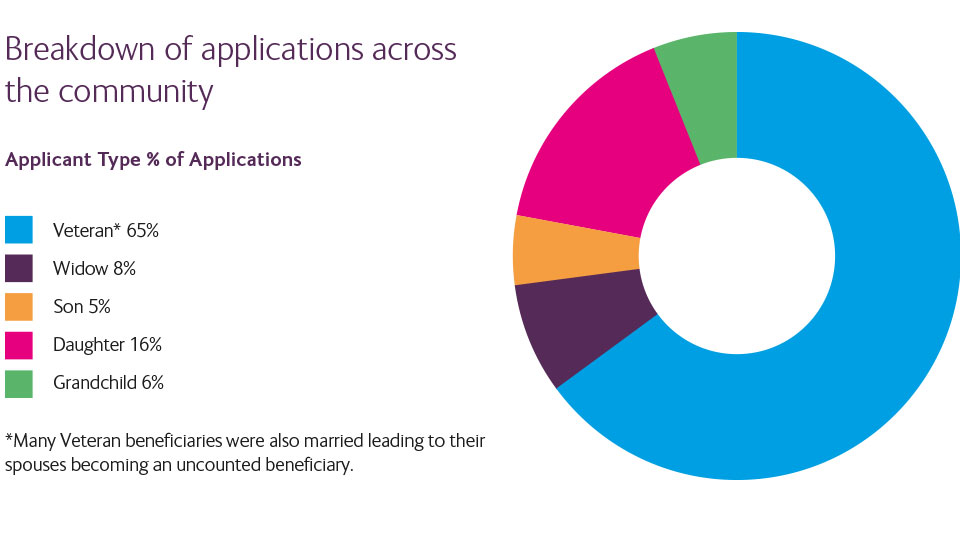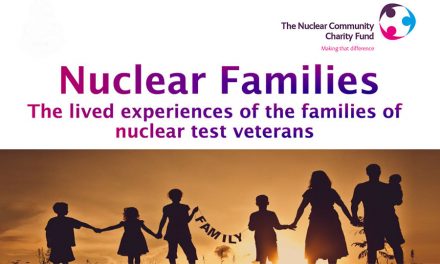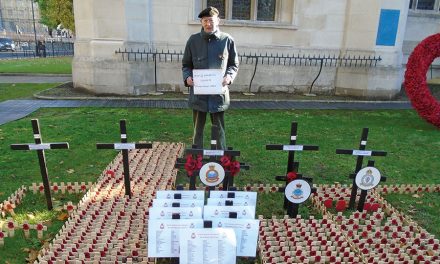Nuclear Community Care and Wellbeing Fund
Project Organisation: Nuclear Community Charity Fund
Project Cost: £110,000

Project Activities
Provide direct grants to applications within the nuclear survivor community for items and adaptations designed to ease suffering and enhance wellbeing that are not available from the public health service or social service provisions.
Beneficiaries
Members of the Nuclear community identified as most in need of assistance by assessment of their application. We anticipated being able to help around three hundred people in the first year of the project with varying grants on anything between £30 and £3000 this will be reviewed and inform the development of the project in future years.
Progression
A ‘Grant Panel’ was formed from amongst the NCCF Trustees and a number of initial principles of operation were established: The Grant Panel members were not identified prevent lobbying, Applications were anonymised to further reduce Grant Panel members from having to declare conflicts of interest or responsibility.
After the initial six months of operation the activities of the project fell into three areas: Main application process, Simplified application process and Assistance to attend events. The Trustees monitored the progress of these three aspects of delivering care and wellbeing support to potential beneficiaries.
Revision of the Project
With the demise of Project 02 – Nuclear Community psychiatric and psychological assessment and treatment program, a case for the transfer of the residual funding to the Care and Wellbeing Fund was produced at the request of the Trustees of the BNTVA 1131134 by BH Associates. This case was accepted by the AVF and the funding was reallocated, this provided a significant increase to the monies for Care and Wellbeing support. The transfer effectively raised the allocated funding to £320,265.92.
When the Phase II bid was achieved the Treasury made the charity a significant offer; rather than run a number of projects over a three year period drawing down the individual project funding over that period the BNTVA 1131134 was asked if it could accept a block endowment from which the proceeds could be used to address not only the initial Phase II projects but also provide Care Wellbeing and Inclusion Support to the nuclear community for a period of at least 15 years. The provision was to be managed by a separate charity to be created by the division of the BNTVA 1131134 between two new organisations.
This proposal was accepted by the Trustees of the BNTVA 1131134 and was put to the membership at the following AGM where it was supported without objection. The implications for the Phase I Care and Wellbeing fund meant that the remaining monies would have to be managed to cover applications for support for at least 12 months from the investment of the endowment to allow for it to produce a return.
The trustees considered the best way to manage the fund to achieve this and imposed an immediate suspension on the Support to Attend Events and the Simplified Grant scheme.
During 2017 the mandate from the AGM was delivered and two completely new organisations were created. The Nuclear Community Charity Fund, Foundation CIO No 1173544 and a new Foundation CIO, The British Nuclear Test Veterans Association No 1173575.
The management and residual funding of the Phase I projects was novated to the new NCCF who undertook the responsibility for the completion of the project.
Conflicts of Responsibility and the need to engage directly with the beneficiary community: Initially there were a number of Trustees positions on the NCCF board that were reserved for Trustees of the New BNTVA, it was initially thought that this would create a convenient link to the beneficiary pool of the charity. However, after a number of incidents, it was found that joint membership was creating conflicts of responsibility that were working against the charitable purpose of the NCCF.
The NCCF Trustees voted to remove the BNTVA integration and replace it with ‘independent members of the nuclear community’. The remaining three Trustees who were also BNTVA Trustees resigned their BNTVA positions. This allowed the NCCF and the Grant Panel to continue to operate independently without the conflict of responsibilities being caused by the significant changes in activity direction that were adopted by the new BNTVA Board.
Project Outcomes
The Simplified Scheme managed 18 applications and made £1995.00 of provision. Mainly for disabled living adaptations (DLA’s). It was noted that as time progressed there were an increasing number of enquiries for additional applications and items that would not strictly be classed as DLA’s.
The suspension of the scheme to allow management of the Phase I funding the ability to bridge the gap before Phase II funding became available resulted in an opportunity to review the management of this scheme.
The Trustees decided that it was potentially open to abuse which would mean the charity was not managing its finances in a manner appropriate to its charitable purpose.
The Care Wellbeing and Inclusion Fund application and disclosure process was redesigned and technological developments introduced by BH Associates in 2018 which meant the Grant Panel was moving to streamlined applications managed by monthly on-line meeting. These allow a rapid response to any situation and effectively rendered the simplified process redundant.
The Assistance to Attend Events scheme was also suspended during the period of the funding bridge. The scheme had assisted members of the nuclear community to attend three events at a cost of £26,075.00, the scheme made just over 200 grants of support.
The Trustees reviewed the support made through this scheme and whilst the initial concept had been to offer a set level of support for particular events from which applicants could submit, in practise all applications had been supported because the scheme did not correctly identify the neediest members in the community in terms of suffering and the ability to address that suffering.
When the NCCF was established as an independent charity the project responsibilities and funding was also vested across. The NCCF Trustees found that as the Events scheme was part of the Care Wellbeing and Inclusion Fund all grants must comply with the Charitable Purpose of the organisation and be in the public good.
Un-tested applications were clearly out with this requirement and the Trustees could have been brought to task by the Charity Commission for misuse of funds. Paying £80 for someone to attend the All Tests Reunion when they openly admit they have over £20,000 in savings is not within the charitable purpose of the NCCF, especially when that could deny another person a disabled living adaptation that would benefit their life on a daily basis.
Any assistance requests from individuals must be subject to the same controls as any other grant from the charity to ensure, we have a duty to address suffering amongst the most needy within our community obtaining best value and widest impact from the limited resources at our disposal.
As with the Simplified scheme, the revised CWI Fund processes also make the Events scheme redundant and the Trustees took the decision not to reopen the scheme under Phase II.
Care and Wellbeing Applications
During the three year life of the phase I scheme over 80 applications were received, of these 11 were rejected by the Grant Panel and 13 were withdrawn by the applicant for various reasons.
The rejections were made for a number of reasons: Refusal by the applicant to provide enough information for the Grant Panel to make a balanced decision, requests for items that were already available from state funded provision and a number of cases where it was found the applicant had enough wealth to easily address their own need.
The Trustees reviewed all the reasons for rejection and where possible provided information to the community within the magazines and through our roadshow. The education applicants as to what could be requested appears to have been effective as a significant drop in the level of rejections was noted in the final year of the project.
BH Associates were contracted to manage the applications and the provisioning of support, throughout the project they worked closely with both the Grant Panel and the Trustees to ensure that the application, consideration and provision process ran efficiently whilst remaining within the parameters of the project and grant.
The growing experience of providing for the needs of our community was also supplemented by the services of a professional Occupational Therapist organisation. In cases where there was uncertainty over the measures needed an OT Assessment would be organised. This produced a comprehensive set of recommendations professionally identified. In many cases the OT identified issues for support that the applicant had not considered. This ensured we provided the best support possible tailored to the needs of the individual.
Because the charity does not have a national network of support workers we have made use of the Sailors, Airmen and Families Association (SSAFA) charities local Case Worker system. This has also added value to the provision as often the caseworker will provide additional help, advice, and support to the applicant.
A number of reviews and improvements to the processes were also conducted and during the project life, some arose from the recognition of potential issues by the Project managers and others from issues surrounding specific applications.
One of the key factors of the scheme campaigned for and won was that there must be provision for the entire community, not just the veterans. This was made clear and fully accepted at all stages of the final negotiations with the Government, within the EOI and in the final bid. All members of the community must be able to benefit from the fund regardless of generation. This also included the ability to provide for the veteran who had already passed away.





The NCCF were also keen to ensure that information about the support available was delivered further than just the membership of the BNTVA. As far as we are able to establish there has been a fairly even match of BNTVA Associate Members to non-BNTVA beneficiaries.
The average amount of funding allocated per application has been just over £4000. During the project, we have worked on joint provision with the Royal Air Force Benevolent Fund (RAFBF) and Soldiers, Sailors, Airmen and Families Association (SSAFA) which has increased the reach of some grants significantly.


Further Activities: The systems and procedures developed during the delivery of this project has been directly adopted by the Phase II Care Wellbeing and Inclusion Fund (CWI Fund). BH Associates have created an internet based secure system allowing the Grant Panel to sit as required to review applications. This has greatly increased our reaction times and enhances our ability to provide timely help to those in need.
We have also developed a greater understanding of the common needs of the community and the most effective methods to address them, this knowledge has all been carried to the Phase II funded CWI Fund adding value and quality to the project.
As has been observed the Simplified Application and the Assistance to Attend Event schemes have now become redundant with the introduction of the more responsive application process.
Portfolio Management Partner
BH Associates were contracted to manage the portfolio of projects and provide the necessary day to day back office support to the charity. The decision to engage BH Associates proved to be a very beneficial move. The level of assistance and support provided by the company has been far in excess of what was asked in the contract, they have willingly undertaken additional work enhancing the ability of the charity to discharge its responsibilities.
It has been clear that the empathy shown by the directors of our Portfolio Partner due to their previous connections and experience within the nuclear community has added significant value to their contribution in terms of both advice and activity.
The dedication to the NCCF by our Portfolio Partners has extended readily into the Phase II projects where they continue to make great contribution.
Conclusion
After the initial disappointment of not achieving the full amount of monies called for by the Recognition Campaign, the Trustees of the Old BNTVA and NCCF set about cutting the cloth to provide maximum impact across the needs of the community.
Significant concessions were made to the research project conducted by Brunel University to provide meaningful results within this restricted funding. The impact on the Care and Wellbeing fund was also considerable however when the mental health project was withdrawn and the residual funding was reapportioned a greater flexibility and innovation was enabled to address community needs.
As the projects progressed their delivery afforded the NCCF the opportunity to learn and develop management skills and procedures, a theme of continual improvement has been present throughout the life of the Phase I Portfolio and continues to be the legacy as the NCCF move to Phase II.
It is clear from historical events that the original BNTVA charity having achieved its Recognition Campaign goals created the NCCF to deliver the fruits of the campaign to the nuclear community. The hard work of the past decade was complete and the reins of trusteeship for the future of the British Nuclear Community were passed to the NCCF.




